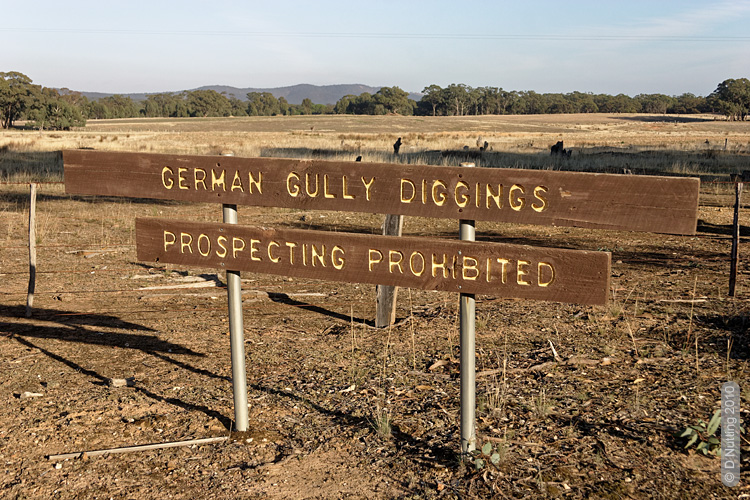Gold in Victoria
'German Gully' placenames on Victorian goldfields
On the gold fields diggers tended to work together in groups according to their nationality. Gullies were often named after the non-British nationality of either the diggers who worked in them, or of the first discoverer of gold there.[1]

German Gully diggings, 1854, near Dunolly
John Tully wrote in his book Dunolly and Tarnagulla Goldfields (Pomonal (Victoria): Redman Press, 1988) that places named Long Gully, Surface Gully and German Gully existed on many goldfields.
| Year | Location |
|---|---|
| 1852 | German Gully, Fryerstown (Castlemaine region) |
| 1853 | German Gully, McIvor-Heathcote goldfield |
| 1854 | German Gully, Maldon |
| 1854 | German Gully, Dunolly |
| 1854 | German Gully, Yandoit |
| 1855 | German Gully, Moliagul |
| 1856 | German Gully, Taradale |
| 1858 | German Gully, northeast of Stawell |
| 1859 | German Gully, Creswick |
| 1859 | German Gully, Tarnagulla |
| ~1860 | German Gully, Baw Baw goldfields, Gippsland |
| 1860 | German Gully, Inglewood |
| 1860 | German Gully, Bowman's Forest (approximately 20 km east of Wangaratta) |
| 1861 | German Gully, approximately 8 km north of Moonambel in the Pyrenees region |
| 1863 | German Gully, Dunolly (Heinrich Ellmer's claim) |
| 1864 | Prussian Gully, in The Whipstick (north of Bendigo) |
♦ Notes:
1. Bate, Weston. (1999). Victorian Gold Rushes. Ballarat (Vic.): The Sovereign Hill Museums Association. p.28
This list of 'German Gully' placenames is based on information in: Flett, James. (1970). The History of Gold Discovery in Victoria. Melbourne: Hawthorn Press.